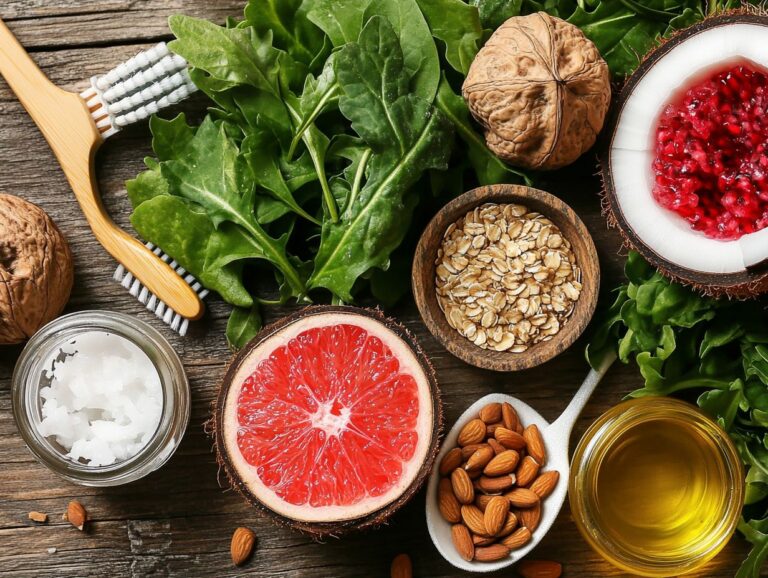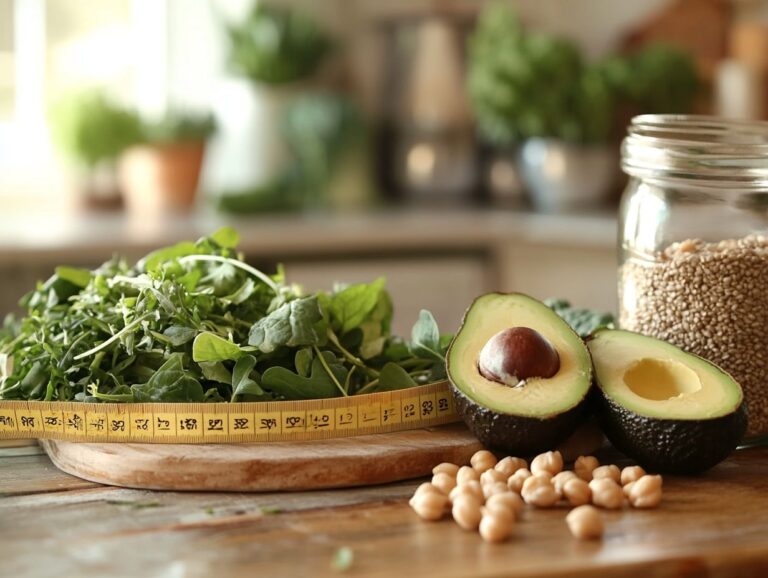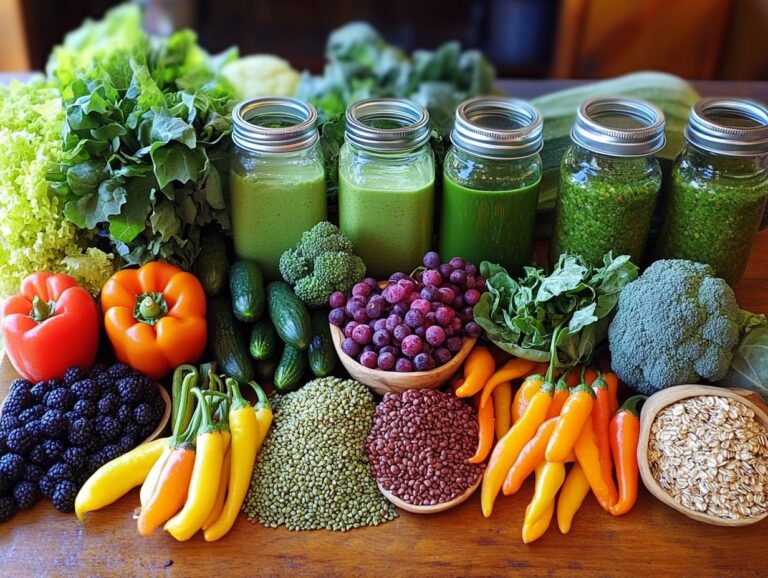Acid reflux is an uncomfortable condition that disrupts many aspects of the daily lives of those affected. Consulting a nutritionist and understanding its symptoms, causes, and potential dietary solutions can help individuals manage the condition more effectively. A vegan diet may offer relief for those suffering from acid reflux by emphasizing plant-based foods like broccoli, asparagus, and green beans that soothe the stomach, suggesting lifestyle changes that can make a difference, and exploring natural remedies, such as chamomile and ginger teas, that may provide assistance. By learning how to navigate dietary choices, individuals can alleviate discomfort, improve their digestive health, and enhance their overall well-being.
Key Takeaways:
- Eat a variety of plant-based foods including legumes, nuts, and whole grains to help soothe your stomach and alleviate acid reflux symptoms.
- Avoid trigger foods and gradually transition to a vegan diet to reduce the risk of acid reflux.
- Consult with a registered dietitian and keep track of your symptoms to ensure a healthy and balanced vegan diet for acid reflux management.
What Is Acid Reflux?
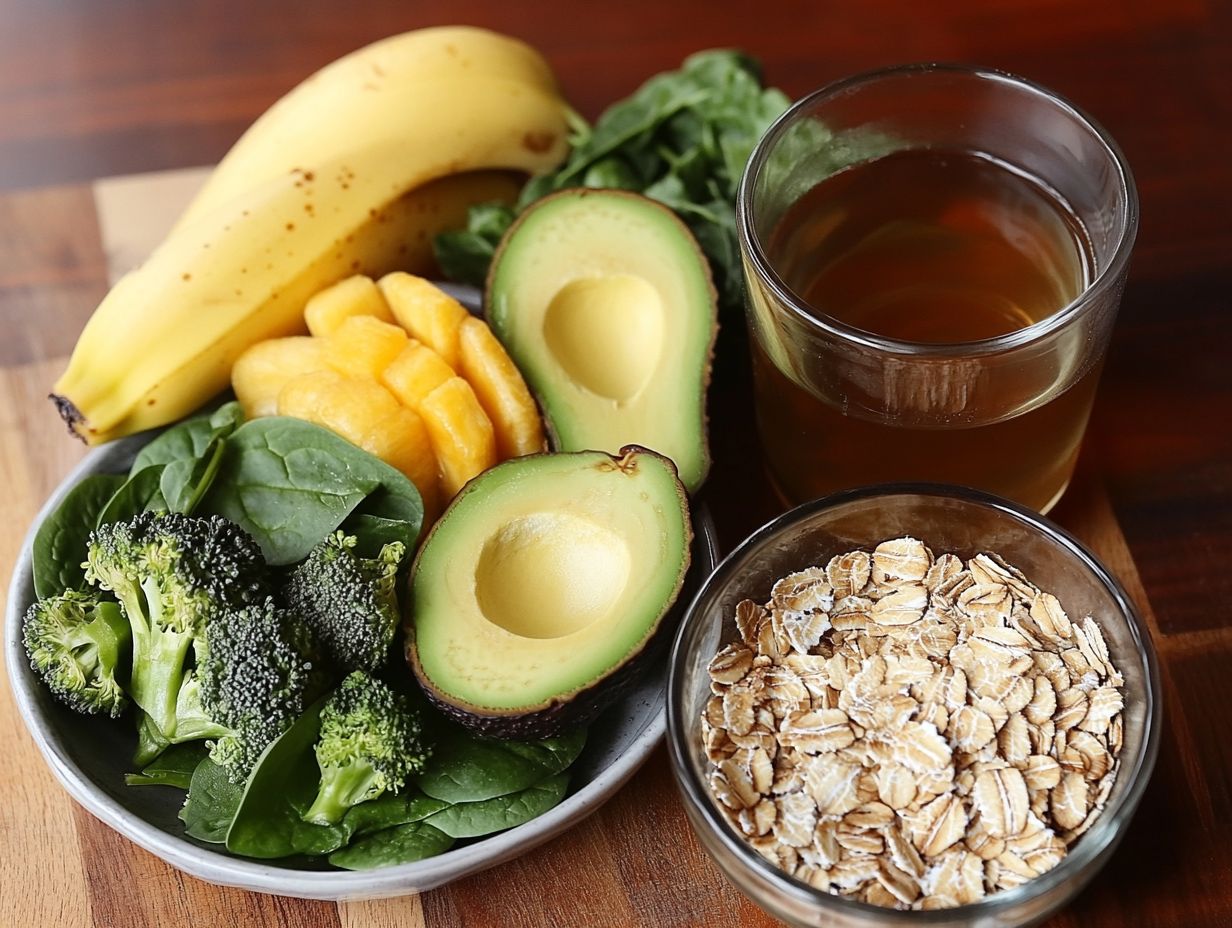 Acid reflux, commonly referred to as gastroesophageal reflux disease (GERD), occurs when stomach acid flows back into the esophagus, causing discomfort and various symptoms, including heartburn. This condition is prevalent and creates a significant need for effective management techniques. Understanding acid reflux and its effects on the body is crucial for individuals seeking treatment and prevention strategies, especially for those following specific diets, such as vegan or vegetarian, which may influence their digestive health.
Acid reflux, commonly referred to as gastroesophageal reflux disease (GERD), occurs when stomach acid flows back into the esophagus, causing discomfort and various symptoms, including heartburn. This condition is prevalent and creates a significant need for effective management techniques. Understanding acid reflux and its effects on the body is crucial for individuals seeking treatment and prevention strategies, especially for those following specific diets, such as vegan or vegetarian, which may influence their digestive health.
What Are The Symptoms Of Acid Reflux?
The symptoms of acid reflux can vary in intensity, ranging from mild to severe, and include heartburn, regurgitation, sore throat, and difficulty swallowing. These symptoms are indicative of gastroesophageal reflux disease (GERD). It is important for individuals to recognize their symptoms in order to effectively manage GERD, especially when considering dietary implications and lifestyle changes. Vegetarians and vegans may experience specific symptoms related to certain plant-based foods, such as a burning sensation in the chest, known as heartburn, which occurs when stomach acid irritates the esophagus. This discomfort is often more pronounced after consuming acidic or spicy foods. Additionally, regurgitation, which is the backup of partially digested food or acid into the throat, can leave a sour taste in the mouth. A consistently sore throat or hoarseness may also occur due to acid moving up into the throat, typically accompanied by difficulty swallowing or the sensation of a lump in the throat.
What Causes Acid Reflux?
Acid reflux is caused by a combination of dietary, lifestyle, and anatomical factors, with gastroesophageal reflux disease (GERD) being the most severe form. Common triggers for acid reflux include:
- High-acid foods
- Spicy foods
- Lifestyle factors such as obesity and smoking
All of these can worsen symptoms. Individuals, particularly those following vegan and vegetarian diets, should be aware of these causes of acid reflux to effectively manage their condition.
1. Foods That Trigger Acid Reflux
Certain foods are known to trigger acid reflux symptoms, making it important for individuals, especially those managing gastroesophageal reflux disease (GERD), to identify them. Understanding which foods can cause discomfort enables those suffering from GERD to make better dietary choices. High-acid foods, such as tomatoes, citrus fruits, and spicy dishes, are often linked to irritation of the esophagus, leading to heartburn and other unpleasant sensations in individuals with GERD. In contrast, low-acid foods, including oatmeal, bananas, and green leafy vegetables, are more commonly associated with symptom relief. By avoiding known trigger foods, individuals can not only reduce acid reflux symptoms but also enhance their overall digestive comfort and well-being.
2. Lifestyle Factors That Contribute To Acid Reflux
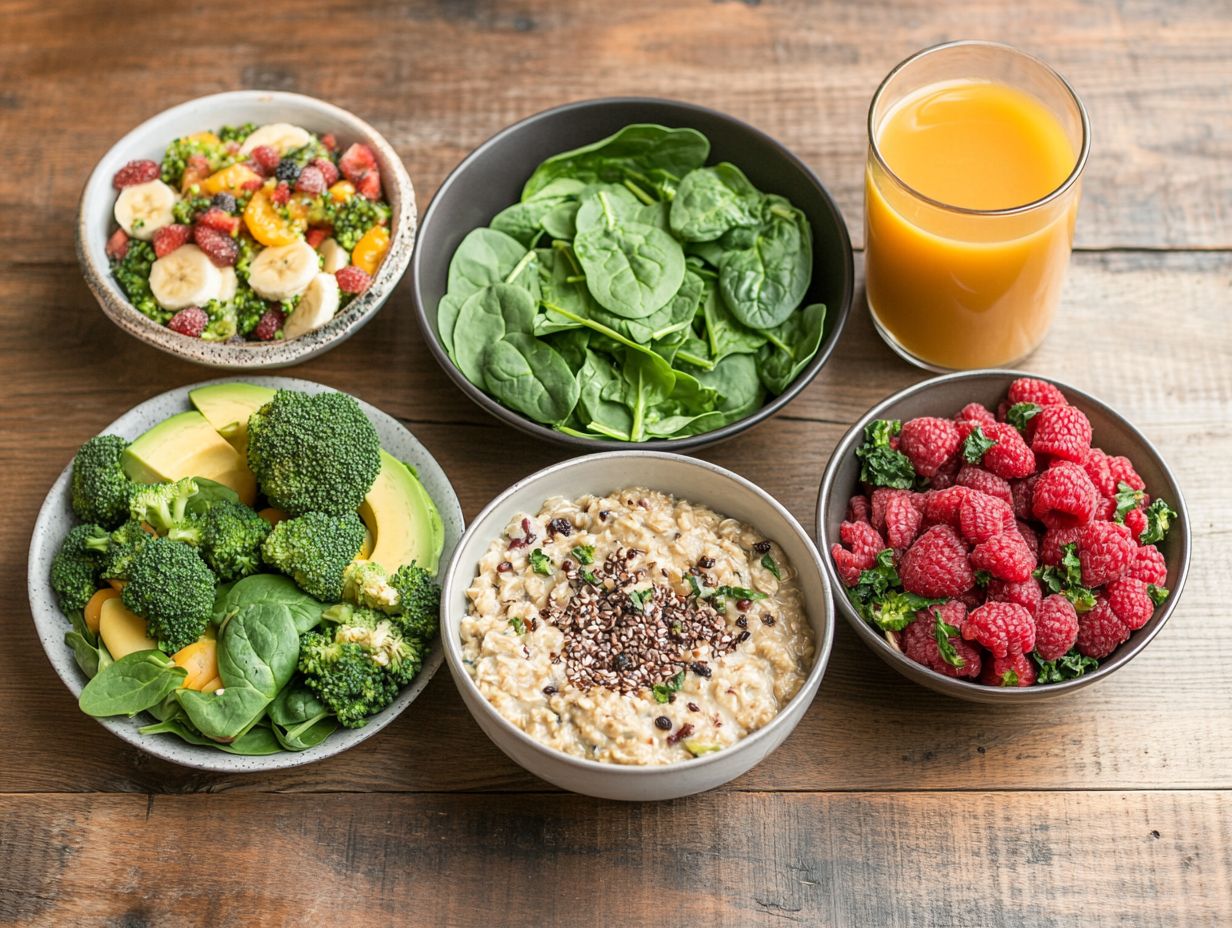 Lifestyle factors play a significant role in the development and worsening of acid reflux, which subsequently affects the overall experience of gastroesophageal reflux disease (GERD). Factors such as obesity, smoking, and a sedentary lifestyle contribute to the frequency and severity of acid reflux symptoms. Understanding and modifying these lifestyle factors are crucial for managing acid reflux.
Lifestyle factors play a significant role in the development and worsening of acid reflux, which subsequently affects the overall experience of gastroesophageal reflux disease (GERD). Factors such as obesity, smoking, and a sedentary lifestyle contribute to the frequency and severity of acid reflux symptoms. Understanding and modifying these lifestyle factors are crucial for managing acid reflux.
- Obesity: Individuals who are overweight or obese are more likely to experience GERD symptoms. Increased weight can lead to higher pressure within the abdomen, which may contribute to reflux symptoms.
- Smoking: Smoking weakens the lower esophageal sphincter, the valve between the stomach and esophagus, allowing more stomach acid to flow into the esophagus and exacerbate reflux symptoms.
- Sedentary Lifestyle: A lack of physical activity can lead to obesity and other related conditions, such as diabetes, hypertension, and coronary artery disease. Inactivity can also result in delayed gastric emptying and increased gastric pressure, both of which contribute to reflux.
Along with these factors, high-stress levels, inadequate sleep, and poor eating habits can negatively impact the management of GERD.
- Stress: Understanding how stress contributes to increased acid production can help patients develop coping strategies. Elevated acid production can lead to more severe reflux symptoms. Furthermore, anxiety and stress can cause increased swallowing of air, contributing to bloating and discomfort.
- Poor Sleeping Patterns: Reduced sleep duration and poor sleep quality, particularly among older adults, are independent predictors of increased GERD symptoms. Sleeping posture can also worsen GERD; for instance, sleeping on the right side or on the back and stomach can increase the frequency of nighttime reflux. Additionally, lack of sleep can contribute to obesity, which is a known risk factor for GERD symptoms.
- Poor Eating Habits: Delayed gastric emptying, often occurring after large meals, can create increased pressure in the stomach and lead to reflux. Consuming high-fat meals can also slow gastric emptying and exacerbate reflux symptoms. It is advisable for GERD patients to eat smaller meals and to limit the intake of trigger foods such as caffeine, spicy foods, and acidic foods. Furthermore, avoiding meals at least two to three hours before bedtime is recommended.
- Exercise: Regular physical activity has been shown to reduce GERD symptoms and is an important lifestyle modification. Aerobic exercise improves the esophagus’s response to acid and decreases esophageal acid exposure. For overweight and obese individuals, simple activities like walking after meals can enhance digestive health. Low-impact exercises, such as yoga and tai chi, can also help alleviate stress and anxiety.
In conclusion, lifestyle factors significantly impact the reduction of GERD symptoms and the improvement of patients’ quality of life, especially when combined with dietary recommendations.
How Can A Vegan Diet Help With Acid Reflux?
A vegan diet, rich in high-fiber and low-acid foods, can be beneficial for individuals with acid reflux, as it typically consists of plant-based, high-fiber, low-fat, and low-acid foods that aid digestion and may alleviate symptoms of gastroesophageal reflux disease (GERD). Adopting a vegan or vegetarian diet can help reduce the occurrence of heartburn while also enhancing overall digestive health through the inclusion of nutritious vegetables, fruits, and whole grains.
1. Plant-based Foods That Help Soothe The Stomach
Certain plant-based foods can soothe the stomach and reduce the occurrence of acid reflux symptoms, making them excellent choices for a vegan diet that aids in managing gastroesophageal reflux disease (GERD). Incorporating legumes and tofu into meals also adds protein while maintaining digestive ease. Oatmeal, bananas, and leafy greens not only provide essential nutrients but are also easy for the digestive system to process, which is particularly beneficial for individuals experiencing heartburn or other reflux symptoms. Additionally, coconut milk can be a gentle alternative. Along with these staple foods, ginger and chamomile tea are well-known for their anti-inflammatory properties, which can alleviate stomach discomfort and reduce irritation. Sweet potatoes and butternut squash are rich in fiber and vitamins, promoting digestion and overall gut health. Avocados offer healthy fats and a creamy texture without triggering reflux episodes. Almonds serve as a protein-rich snack that can help people feel full while being low in acidity. Incorporating these ingredients into smoothies, salads, or enjoying them as individual snacks can create satisfying meals.
2. Foods To Avoid On A Vegan Diet For Acid Reflux
A vegan diet can be beneficial for managing acid reflux, but it’s important to avoid certain foods to prevent symptoms associated with gastroesophageal reflux disease (GERD). For instance, processed foods like certain pasta, raw garlic, and spicy spices may trigger symptoms. Citrus fruits, spicy dishes, and high-fat vegan foods should be consumed in moderation to help control heartburn and maintain digestive health. Additionally, heavily processed vegan snacks that are high in refined sugars and trans fats can exacerbate symptoms. Even seemingly harmless plant-based foods like garlic and onion can irritate a sensitive stomach, leading to discomfort. Therefore, individuals following a vegan lifestyle should focus on whole, unprocessed foods such as soups with quinoa, legumes, and vegetables:
- Leafy greens
- Oats
- Quinoa
These foods are less likely to trigger acid reflux. Additionally, using olive oil for cooking and almond butter as a spread can further enhance meal quality without discomfort.. By choosing alternatives that promote digestive comfort while adhering to a vegan diet, mealtimes can become easier and more enjoyable, contributing to overall health and well-being.
What Are Other Natural Remedies For Acid Reflux?
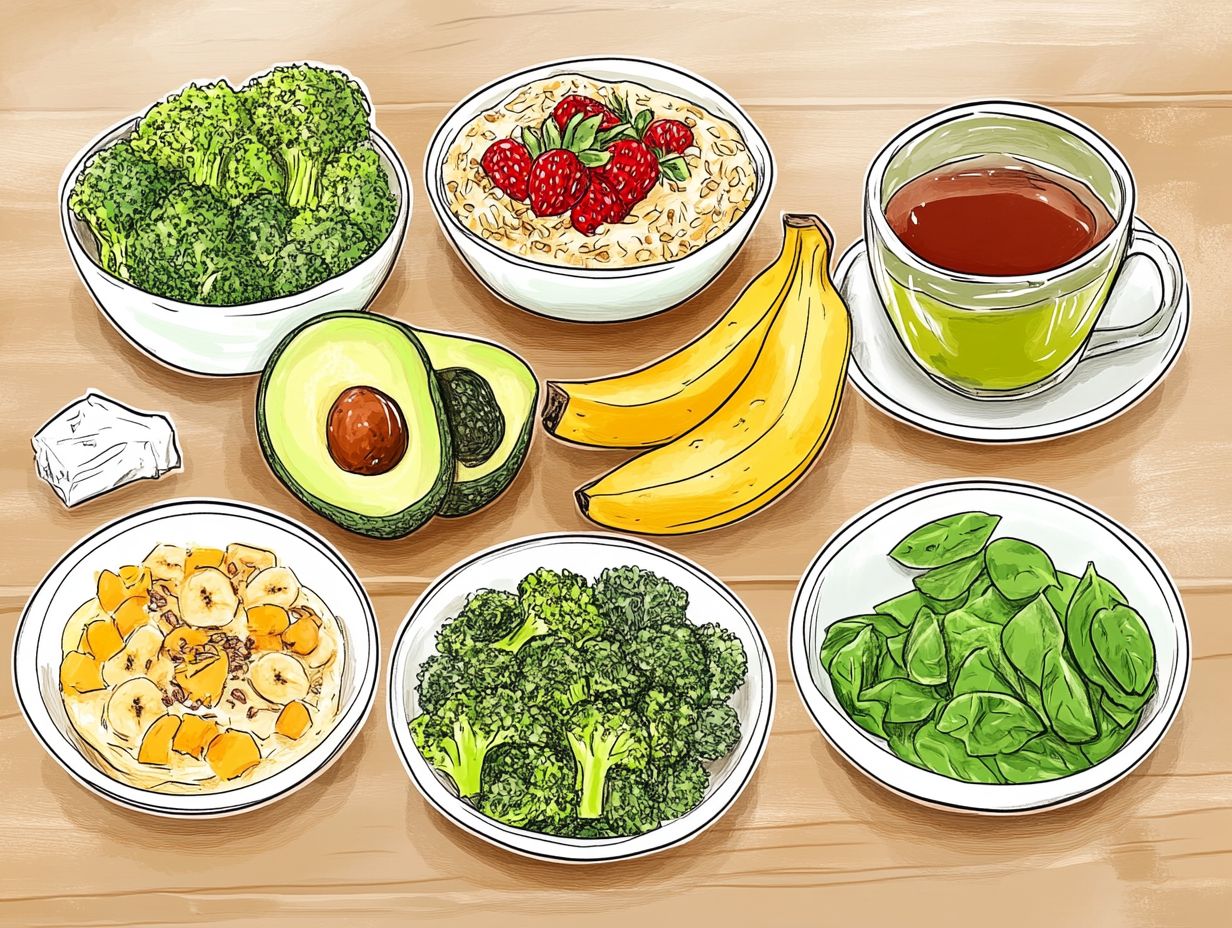 Natural remedies offer alternative relief from acid reflux and its symptoms for those looking to complement dietary changes and lifestyle modifications. Some simple solutions to alleviate digestive discomfort and reduce symptoms associated with gastroesophageal reflux disease (GERD) include incorporating certain herbs and medicinal plants known for their beneficial effects:
Natural remedies offer alternative relief from acid reflux and its symptoms for those looking to complement dietary changes and lifestyle modifications. Some simple solutions to alleviate digestive discomfort and reduce symptoms associated with gastroesophageal reflux disease (GERD) include incorporating certain herbs and medicinal plants known for their beneficial effects:
- ginger
- chamomile tea
- aloe vera juice
1. Apple Cider Vinegar
Apple cider vinegar is often regarded as a natural remedy for acid reflux due to its potential to improve digestion and help balance stomach acidity. Some individuals report that drinking diluted apple cider vinegar before meals can alleviate symptoms of gastroesophageal reflux disease (GERD), as the dilution makes it more palatable and safer to consume by lowering its acidity level. Additionally, apple cider vinegar is believed to promote healthy gut flora, which may contribute to overall digestive health and potentially reduce the frequency of acid reflux episodes. A common method of incorporating it into the diet is to mix one to two tablespoons of apple cider vinegar into a glass of water and consume it before meals. However, it is advisable for individuals to consult a healthcare professional to determine whether this remedy aligns with their health goals, especially if they have pre-existing conditions.
2. Ginger
Ginger is renowned for its anti-inflammatory properties and is considered one of the best natural remedies for acid reflux, as it supports digestive health by reducing nausea and discomfort. Incorporating ginger into foods or drinking ginger tea can help alleviate symptoms for individuals suffering from gastroesophageal reflux disease (GERD). This versatile root can be easily added to a variety of meals, such as stir-fries and smoothies, enhancing flavor while aiding digestion. Another simple method is to slice fresh ginger and steep it in hot water to create a soothing tea that calms the stomach and addresses digestive issues more broadly. Additionally, ginger can be combined with other herbs such as licorice for enhanced flavor and potential benefits. For added variety, some people may choose to chew on ginger candies or sprinkle ginger powder into their recipes to relieve symptoms. Incorporating ginger into vegetarian meals or as a seasoning in a recipe can also be beneficial. Ginger s natural ability to soothe the digestive tract and promote bile production makes it a mild yet effective option for those seeking relief from acid reflux symptoms.
3. Aloe Vera Juice
Aloe vera juice is a natural remedy that many individuals find helpful for soothing the symptoms of acid reflux, as it may promote healing of the esophagus and enhance digestion. Drinking aloe vera juice in moderation could potentially provide a calming effect for those experiencing gastroesophageal reflux disease (GERD). This beneficial juice is well-known for its anti-inflammatory properties, which can help reduce irritation in the digestive tract. Many people choose to incorporate aloe vera juice into their daily routines by mixing it with water or other juices, making it an easy and convenient addition to their diets. Not only may this natural drink aid in symptom relief, but it can also support overall digestive health. For those suffering from the discomfort of acid reflux, incorporating aloe vera juice might lead to improved comfort and a greater sense of well-being.
What Are The Potential Risks Of A Vegan Diet For Acid Reflux?
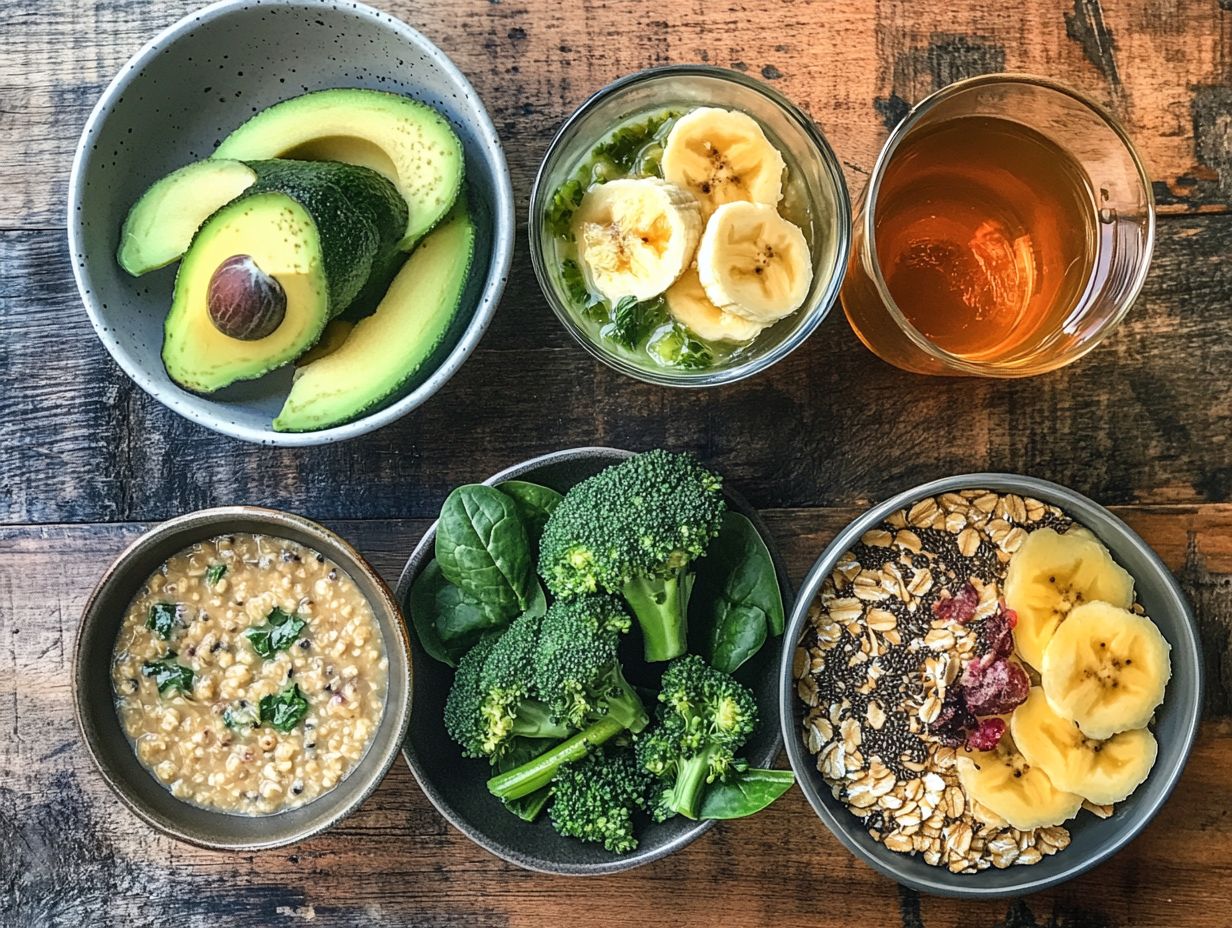 Although a vegan diet is linked to numerous health benefits, there are potential risks to consider when treating acid reflux, particularly in patients with gastroesophageal reflux disease (GERD). If a vegan diet is not well-planned, nutritional deficiencies may arise, which can impact overall digestive health and exacerbate reflux symptoms in individuals who are particularly sensitive.
Although a vegan diet is linked to numerous health benefits, there are potential risks to consider when treating acid reflux, particularly in patients with gastroesophageal reflux disease (GERD). If a vegan diet is not well-planned, nutritional deficiencies may arise, which can impact overall digestive health and exacerbate reflux symptoms in individuals who are particularly sensitive.
How To Incorporate A Vegan Diet For Acid Reflux Into Your Lifestyle?
A vegan diet for managing acid reflux is achievable through careful planning and lifestyle modifications, particularly for individuals with gastroesophageal reflux disease (GERD). By adopting a systematic approach and collaborating with a registered dietitian, one can ensure that the diet is nutritionally adequate, focuses on foods that alleviate symptoms, and promotes an overall healthy lifestyle. Exploring guides and tips from professionals, such as Zaya Care, can also be invaluable in this journey.
1. Gradually Transition To A Vegan Diet
Gradually transitioning to a vegan diet is crucial for individuals with acid reflux, as sudden dietary changes may exacerbate symptoms associated with gastroesophageal reflux disease (GERD). Slowly incorporating plant-based foods while observing how the digestive system responds can facilitate a smoother adaptation process. This approach allows the body to adjust to new foods that may initially be high in fiber or acidity. Starting with small portions of easily digestible vegetables, such as zucchini or cooked spinach, can be beneficial, as these provide essential nutrients without placing too much strain on the stomach. Adding cauliflower and combining these vegetables with whole grains like quinoa or brown rice can help ensure a balanced intake. It is also important to monitor any reactions during this transition, as certain ingredients may cause discomfort. With careful planning and consideration, one can adopt a vegan lifestyle while minimizing symptoms.
2. Consult With A Registered Dietitian
Collaborating with a registered dietitian can greatly benefit individuals on a vegan diet who are experiencing acid reflux by ensuring their nutritional needs are met while minimizing symptoms of gastroesophageal reflux disease (GERD). A dietitian offers support through personalized meal plans, food choices, and lifestyle recommendations. Along with creating individualized meal plans, a dietitian’s expertise can help individuals identify and avoid specific triggers that are unique to the vegan lifestyle, ensuring they understand which plant-based foods may alleviate symptoms and which could exacerbate them. They can also assist in selecting appropriate substitutes for common allergens or reflux-inducing ingredients, thereby diversifying one’s diet. Furthermore, the dietitian can provide new recipes and cooking methods that maintain flavor without increasing acidity. This comprehensive approach not only promotes symptom relief but also supports a sustainable vegan lifestyle.
3. Keep Track Of Your Symptoms
Tracking symptoms is crucial for patients with acid reflux, particularly those following a vegan diet to manage gastroesophageal reflux disease (GERD). Maintaining a food journal enables individuals to identify trigger foods and beneficial dietary behaviors, ultimately improving symptom management over time. A symptom journal should be incorporated into daily routines, providing patients with valuable insights into how different vegan foods affect their overall well-being. By recording not only what they eat but also how their bodies respond afterward, individuals can pinpoint specific sensitivities that contribute to their discomfort. Additionally, noting the timing of meals and portion sizes can help reveal patterns that lead to symptom occurrences. Monitoring reactions to various plant-based foods, such as tomatoes, citrus, or spicy dishes, is essential for developing a personalized dietary plan that minimizes acid reflux.
